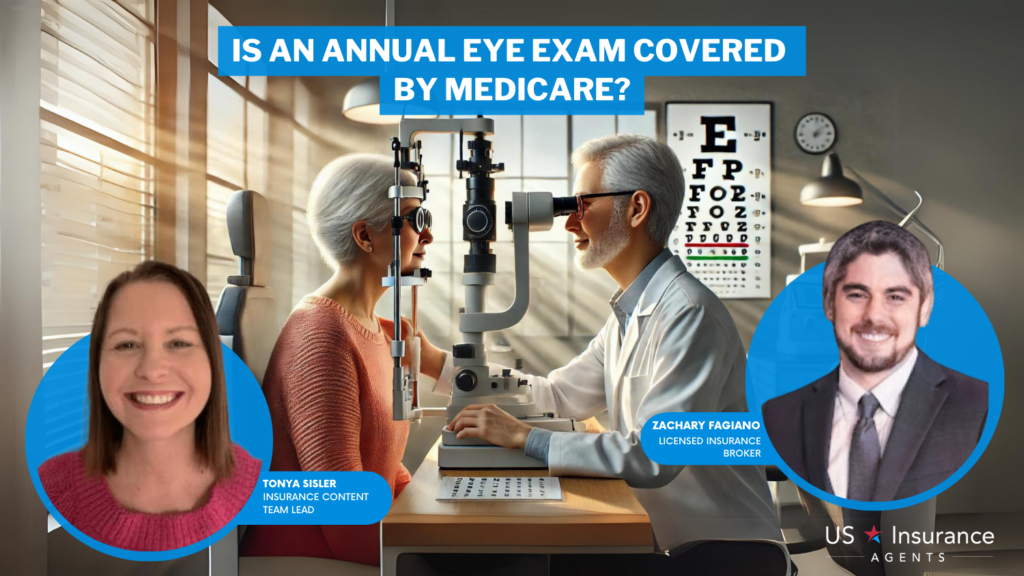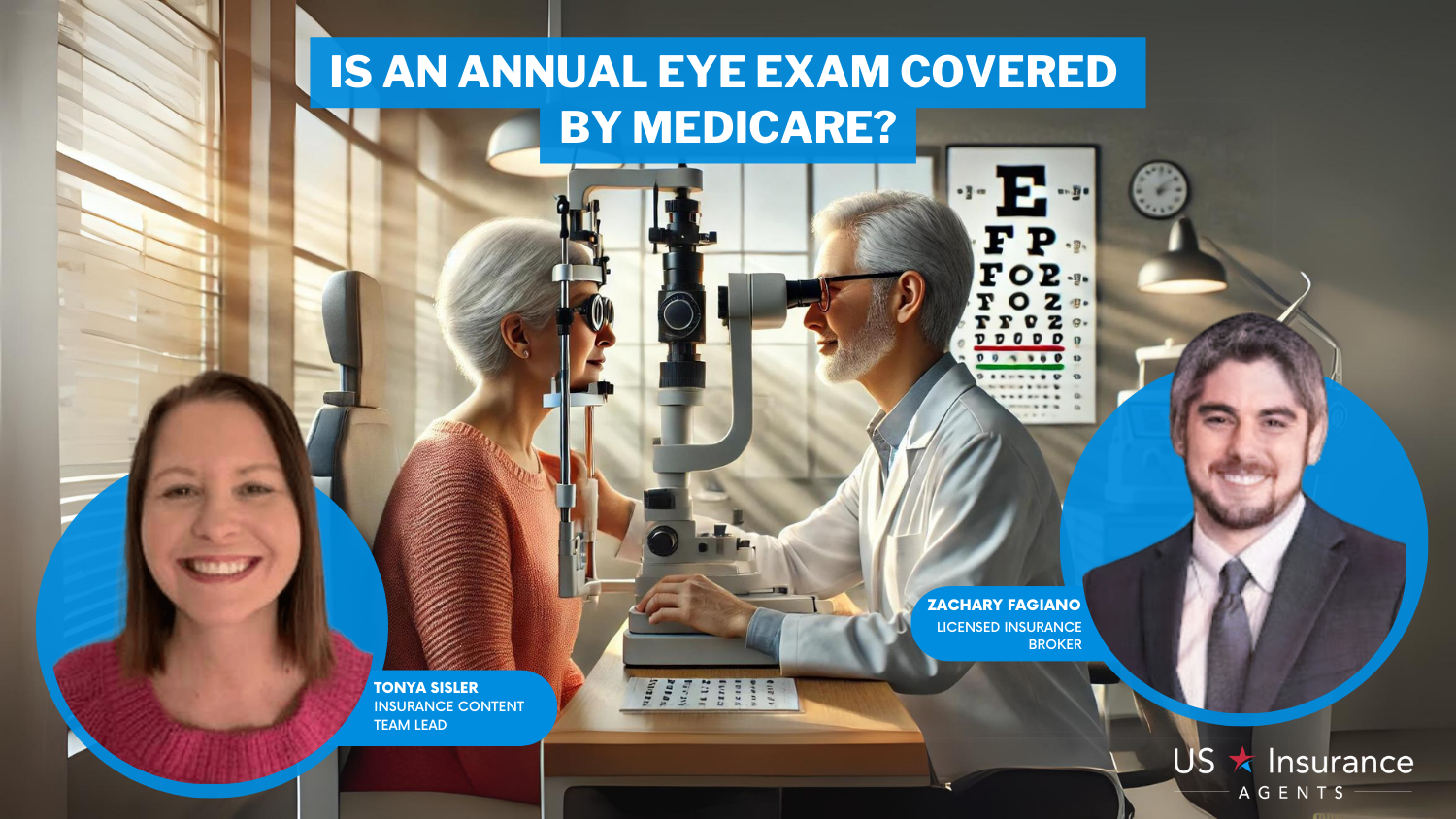Is an annual eye exam covered by Medicare?
Explore the extent of Medicare coverage for annual eye exams and uncover a range of vision care options for your needs. Find the perfect insurance plan from a diverse selection of reputable providers to ensure comprehensive eye health. With our easy-to-use tool, you can conveniently compare quotes tailored to your specific requirements by entering your ZIP code. Don't compromise on the quality of your vision care – take proactive steps to secure the coverage you deserve for a healthier tomorrow!
Read more Secured with SHA-256 Encryption



Table of Contents
Table of Contents


Insurance Content Team Lead
Tonya Sisler has been a technical insurance writer for over five years. She uses her extensive insurance and finance knowledge to write informative articles that answer readers' top questions. Her mission is to provide readers with timely, accurate information that allows them to determine their insurance needs and choose the best coverage. Tonya currently leads a team of 10 insurance copywrite...
Tonya Sisler


Sr. Director of Content
Sara Routhier, Senior Director of Content, has professional experience as an educator, SEO specialist, and content marketer. She has over 10 years of experience in the insurance industry. As a researcher, data nerd, writer, and editor, she strives to curate educational, enlightening articles that provide you with the must-know facts and best-kept secrets within the overwhelming world of insurance....
Sara Routhier


Licensed Insurance Broker
Zach Fagiano has been in the insurance industry for over 10 years, specializing in property and casualty and risk management consulting. He started out specializing in small businesses and moved up to large commercial real estate risks. During that time, he acquired property & casualty, life & health, and surplus lines brokers licenses. He’s now the Senior Vice President overseeing globa...
Zach Fagiano
Updated January 2025
Are annual eye exams covered by Medicare? If you’re seeking answers regarding Medicare coverage for eye care, you’ve come to the right place.

In this comprehensive article, we delve into the intricacies of Medicare coverage for annual eye exams and related services. We discuss the conditions under which Medicare Part B covers eye exams, such as glaucoma, diabetes, cataracts, and macular degeneration.
We also touch upon the limitations of Medicare coverage for routine eye care and prescription eyewear. To ensure you find the best insurance plan that meets your needs, we offer a simple solution: enter your ZIP code and compare rates from the top insurance providers. Take charge of your eye health and secure the coverage you deserve with just a few clicks.
- Original Medicare covers eye health but not vision
- Medicare Advantage covers vision and annual eye exams
- There is a large selection of Medicare Advantage plans with different coverage, rates, deductibles, and co-pays
Does Medicare cover eye exams?
Original Medicare generally does not cover routine eye care. However, while Medicare Part B doesn’t cover eye exams pertaining to preventative annual vision care, it covers certain eye health conditions. This includes exams for medical circumstances such as the following:
- If you have a family history of glaucoma, meet the age requirements for a glaucoma exam, or have diabetes, Medicare may cover exams related to this condition.
- Both exams and surgery pertaining to cataracts are covered under original Medicare. Glasses might be covered too if you’ve had surgery.
- If your eyes are injured, an examination of the damage is covered.
- If you have diabetes and your doctor agrees you need annual exams for diabetic retinopathy, original Medicare covers it.
- Original Medicare pays for care related to macular degeneration, including exams and injections.
You can expect Medicare Part B to cover 80% of the costs of exams and treatment as long as the provider accepts Medicare as insurance. A condition must be deemed medically necessary for Medicare to cover treatment. It also often covers necessary surgery to correct a condition that may require it.
What about annual check-ups and prescriptions?
If outside the scope of the aforementioned conditions, Medicare Part B is not likely to cover annual check-ups. This means that vision care that involves prescription eyeglasses or contacts isn’t covered. The exception is if the vision loss is related to surgery, in which case one pair of eyeglasses or contacts may be covered under Medicare Part B.
Prescriptions are not covered under original Medicare unless you’re a part of a separate prescription drug plan. However, most Medicare Advantage plans come with Medicare Part D coverage.
Get a Free Medicare Plan Review
Speak With a Licensed Insurance Agent Today
Secured with SHA-256 Encryption
Does any Medicare plan cover annual vision check-ups?
Medicare Advantage, sometimes called Medicare Part C, is a form of add-on private insurance that is likely to cover routine annual eye exams specifically about prescription eyewear meant to correct vision. The glasses or contacts might also be covered, and the plan may include drug coverage.
There are many other benefits Medicare Advantage has that other forms of Medicare don’t. Routine hearing care is often covered, for example. Dental care coverage is usually an option. You might also have access to wellness programs and discounted gym memberships. Nutrition and fitness are vital components of a healthy lifestyle, and it’s never too late to take a closer look at nutrition and fitness.
Do all Medicare Advantage programs have these benefits?
No. Medicare Advantage programs vary in coverage, benefits, and availability. Some Medicare Advantage plans have provider networks that require you to visit one of their preferred providers for coverage, and some plans might not cover the cost completely but instead reimburse you for most of it.
Medicare Advantage is an add-on private option to Medicare Part B. This means that you must still pay your Medicare Part B rates on top of whatever you’re paying for Medicare Advantage. Medicare Advantage plans can be one of many types of insurance, including HMOs.
How much does Medicare Advantage cost?
Similar to other kinds of insurance, Medicare Advantage plans vary in monthly rates, co-pays, deductibles, and other fees. For some Medicare Advantage plans, there is a $0 added monthly rate to your Part B monthly rate, and others have higher rates. Generally, the lower the monthly rate, the higher your deductibles and co-pays will be, and vice versa.
Medicare Advantage plans also differ in other ways, such as out-of-pocket limits, sizes of provider networks, and prescription drug coverage.
There are differences in overall quality and service, as well. A Medicare Advantage company with a bad reputation may make your life difficult in ways that go beyond what they cover or what their rates are.
As mentioned previously, most Medicare Advantage plans come with Part D prescription insurance, but if you choose to get Part D coverage that’s separate from a Medicare Advantage plan, it will typically cost you between $0 and $77.10 per month based on your income.
How do I join a Medicare Advantage plan?
You must have Medicare Part A and Part B before you can enroll in a Medicare Advantage plan. Some Medicare Advantage companies allow you to apply online, whereas others require you to submit a paper form. Even if you can’t apply for a plan online, all plans are required to give you the option of a paper form.
If you do not sign up for a Medicare Advantage plan in your initial enrollment period (the three months before the month you turn 65 or the three months afterward), you can sign up during a special enrollment period or fall open enrollment period.
Be wary of being solicited for a Medicare Advantage plan. Medicare Advantage companies never call you without you first specifically asking to be called. Additionally, they never ask for financial information over the phone. If you receive an unsolicited call or home visit offering a Medicare Advantage plan, it is a scam that you can report to 1-800-MEDICARE.
Get a Free Medicare Plan Review
Speak With a Licensed Insurance Agent Today
Secured with SHA-256 Encryption
Case Studies: Coverage of Annual Eye Exams under Medicare
Case Study 1: John’s Ongoing Eye Condition
John is a 68-year-old retired individual who has been diagnosed with glaucoma, a chronic eye condition. He requires regular eye exams to monitor his condition and ensure timely treatment. John is enrolled in Original Medicare (Part A and Part B) and has a Medigap policy.
In his case, Medicare covers annual eye exams as part of preventive services for beneficiaries with certain medical conditions. Therefore, John’s eye exams are covered under Medicare.
Case Study 2: Lisa’s Routine Eye Exam
Lisa, a 72-year-old Medicare beneficiary, is in good overall health and does not have any pre-existing eye conditions. She schedules a routine eye exam to check her vision and overall eye health. In this scenario, Medicare generally does not cover routine eye exams for preventive purposes.
As Lisa’s eye exam is not related to a specific medical condition, she would likely be responsible for paying the full cost of the exam.
Case Study 3: Sarah’s Eye Exam for Diabetes-related Issues
Sarah is a 65-year-old Medicare beneficiary who has been diagnosed with diabetes. She experiences blurred vision and seeks an eye exam to evaluate potential diabetes-related eye problems. In this case, Medicare covers an annual eye exam for beneficiaries with diabetes. Sarah’s eye exam, given her condition, would be covered by Medicare.
Case Study 4: Michael’s Cataract Surgery
Michael, a 75-year-old Medicare beneficiary, is experiencing vision problems due to cataracts. His ophthalmologist recommends cataract surgery. While Medicare covers cataract surgery, it does not typically cover routine eye exams for the purpose of diagnosing or monitoring cataracts.
However, in Michael’s case, the pre-surgical evaluation and post-operative care related to his cataract surgery would be covered by Medicare.
Case Study 5: Rebecca’s Medicare Advantage Plan Coverage
Rebecca, a 70-year-old beneficiary, is enrolled in a Medicare Advantage plan. Medicare Advantage plans are required to cover all services provided by Original Medicare (Part A and Part B), and many plans offer additional benefits. The coverage of eye exams under a Medicare Advantage plan may vary depending on the specific plan.
In Rebecca’s case, her Medicare Advantage plan provides coverage for an annual routine eye exam as an additional preventive service.
Final Thoughts on Medicare and Eye Exams
Medicare Part B covers many health conditions and treatments that are unrelated to prescription eyewear. For that kind of coverage, you might be able to do better with a Medicare Advantage plan. However, not all Medicare Advantage plans offer the same coverage, rates, and co-pays, and you need to compare these to find out which might suit you best.

Frequently Asked Questions
What if I need an eye exam for a reason other than diabetes or a medical condition?
If you need an eye exam for routine vision care, Medicare will not cover the cost. You may want to consider purchasing vision insurance or paying for the exam out-of-pocket.
How often can I get a covered eye exam under Medicare Part B?
If you have diabetes, you are eligible for a covered eye exam once per year. For other medically necessary eye exams, the frequency may vary depending on the specific circumstances of your condition.
Will Medicare cover the cost of glasses or contact lenses?
Medicare does not generally cover the cost of glasses or contact lenses, but it may cover certain types of vision correction surgery.
Do I need a referral from my doctor to have my eye exam covered by Medicare?
In most cases, you do not need a referral from your doctor for your eye exam to be covered by Medicare Part B.
What types of eye exams are covered by Medicare Part B?
Medicare Part B covers yearly eye exams for people with diabetes, as well as exams for diagnosing and treating conditions related to vision and eye health.
What type of Medicare coverage includes eye exams?
Medicare Part B includes coverage for certain types of eye exams.
Are annual eye exams covered by Medicare?
Medicare does provide coverage for certain types of eye exams, but it depends on the reason for the exam and the type of Medicare coverage you have.
Get a FREE Quote in Minutes
Insurance rates change constantly — we help you stay ahead by making it easy to compare top options and save.




